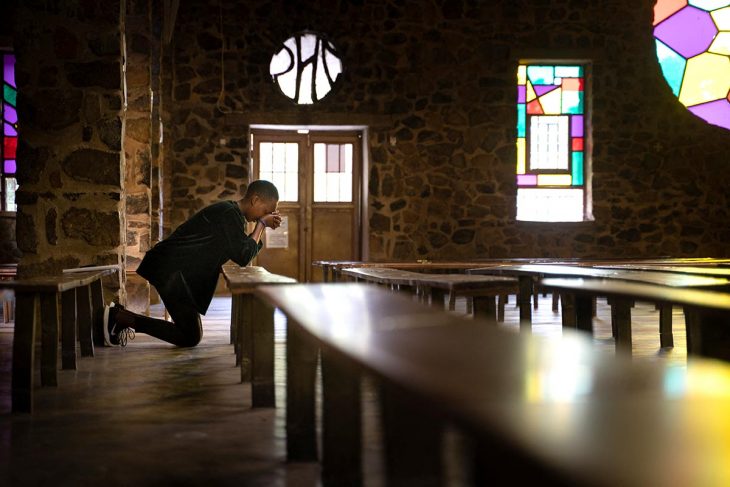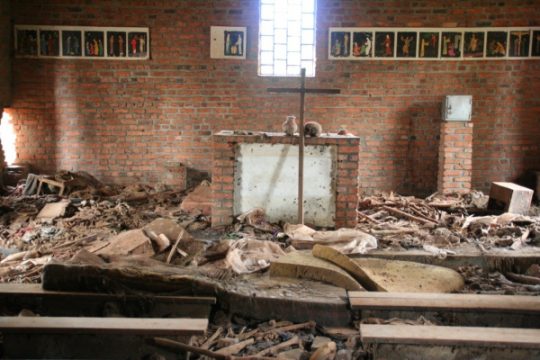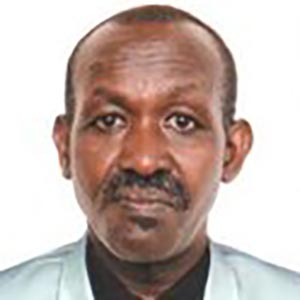On a damp evening last May, in a dimly lit room of a motel next to the presbytery in Butare, southern Rwanda, a diffuse light casts shadows on the wall. Two men are having a conversation. One of them, wearing a priest’s collar, hands clasped as if in prayer, glances left and right. And there is good reason: Father Denis Sekamana, released from prison, is telling his story to a journalist for the first time, from his experience of the genocide to his return to the community, including his trial, conviction and detention. He is so engrossed in his story that he forgets to sip his favourite beer, Virunga, and instead wipes the sweat from his bald head.
"I've been in prison, but prison didn't get to me, it didn't affect me," he explains. This cleric with a philosopher’s composure still seems to have a fit, athletic body, even though he is nearly 80. "I have absolutely no hatred, resentment or distrust" towards the victims,” he asserts. But people say, and he remembers that when he was released from prison in January 2019, a survivor fainted at the sight of him giving the Blessed Sacrament to Christians "with his bloodstained hands” as if nothing had happened.
It was here in Butare that he "carried out genocide", says one survivor, that he was tried, convicted and served his sentence. It is here that he is rebuilding his life, amidst the hostility and indifference of some, indulgence and solidarity of others. Has he returned to his pastoral activities? “My diary is so full," he says, "that I will be overworked if I am not careful.” He says there is also another colleague from Cyangugu “but if there is anyone who has a lot to do, it is me”.
The taboo subject of the "lost priests”
In Rwanda, participation in the genocide was so widespread that the priests, religious men and women, pastors and imams who took part have returned to live among their victims. How are they integrated into their communities? "I don't know, go and ask our representatives" is the answer most often heard from each cleric, pastor or imam approached on this subject. This is a taboo question, each religious denomination wishing to hide its dirty laundry and some going so far as to hide its "lost priests".
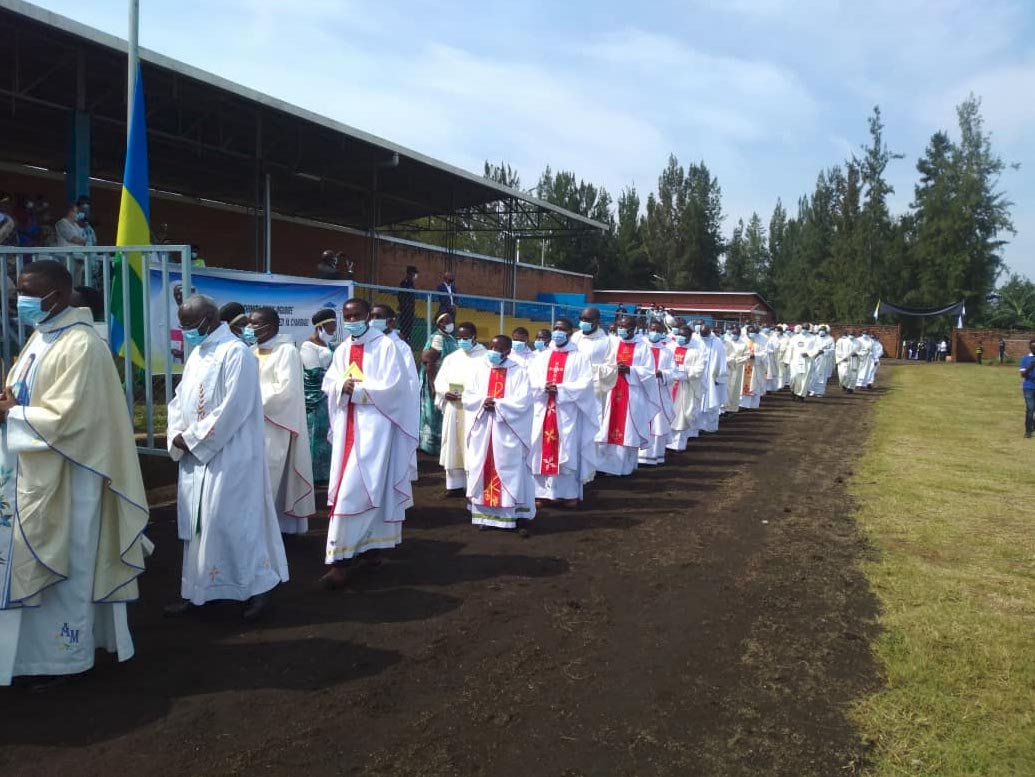
It took us almost a year to arrange the meeting with this “genocidal priest", with clerics, survivors and other journalists saying it was "impossible”, that "these people have a mania for hiding everything" and that "it's a taboo subject" -- so many words that could have ruined the meeting this evening!
Most important for Sekamana, he says, is that he has the trust of the bishop of his diocese. “Most of those who knew me before are asking for me now. Besides, it's not me who decides on my appointment, it's my bishop.” Today, his priestly duties run from Monday to Sunday, until next October, with Biblical sessions, retreats and Masses with communities of nuns in the diocese of Butare.
The priest from Cyangugu he talked about, Father Laurent Ntimugura, is not so lucky. Released after serving a 20-year sentence, "he is almost inaccessible. He lives in the bishop's house under the shadow of his bishop and does not go out. I met him myself during a work visit to the bishop's house. He does not like to talk about his past," says a regular visitor to the bishopric in Cyangugu.
“I am being rehabilitated”
In February 2019, during the funeral of the oldest Rwandan cleric at the time Father Eulade Rudahunga, the bishops forced Sekamana, who was just out of prison, to leave the ceremony and remove his chasuble. This not-so-distant past "hurts" him, he says.
Should this quarantine be lifted? "I wouldn't want something that would put me back on the scene, awaken old demons,” he says. “I am at peace now and I am being rehabilitated." Nevertheless, he does have some misgivings: "I don't read people's hearts. Perhaps there are some who point their finger at me and say ‘look at this Interahamwe, this genocidaire!’”
And he may not be wrong. On the streets of Butare, he cannot go unnoticed, not without someone whispering behind his back. And every ten meters he glances over his shoulder, showing a sense of being watched and wanting to watch his own back. "It's human," he says, because "when you get out of prison, you're afraid of lots of things. If you’re lucky enough to meet people who welcome you with open arms [...], the detractors gradually forget about you."
What if one day the bishops decided to fire priests convicted of genocide? His confident façade suddenly melts. “I would accept it," he says, "but with pain and a broken heart. I would leave convinced that I was a victim of injustice.” For the laity whose responsibility for the genocide has been established, rehabilitation involves a "pastoral ministry of repentance and forgiveness," initiated by a member of the clergy. But paradoxically, the Church has not designed one for the rehabilitation of its priests. "We are different from the laity because of our responsibilities," explains Father Sekamana, adding that "we are in the hands of our bishops, and any decision [about us] is up to them”.
“Parody of a trial”
When asked how his reintegration is going, Pentecostal pastor Mfizi François-Xavier is not very communicative: "I don't know. Go ask our representatives!” He cuts short the interview which he deems to be in "bad taste". Now a Pentecostal in charge of a parish in western Rwanda, in 1994 he was a pastor with the Presbyterian Church at its historic headquarters in Kirinda. When the genocide broke out, he cut short a national seminar for all pastors in Rwanda. Hutu pastors, including François-Xavier Mfizi and Léonidas Ntibimenya, along with their legal representative Michel Twagirayesu, were said to have been involved in organizing and supervising massacres of hundreds of Tutsis, starting with their colleagues.
In a first judgment handed down in June 1999 by a specialized chamber of the Kibuye court, pastors François-Xavier Mfizi and Léonidas Ntibimenya were sentenced to life imprisonment and capital punishment respectively, along with the loss of their civil and political rights. Nearly five years later, the Appeals Court of Ruhengeri, located in the north of the country, acquitted them "far from the victims and witnesses and without their knowledge, after a parody of a trial, corrupted by a missionary", according to a pastor who was a survivor of the Kirinda massacres and a civil party in this case.
In the Presbyterian Church, there is no exception to the rule: all those convicted of genocide are automatically excluded from any function. But Pastor Ntibimenya, who recently died of natural causes, was quickly taken on by the Free Methodist Church, and Mfizi by the Association of Protestant Churches, where he still officiates.
However, in Kirinda, certain images of Mfizi remain in people’s memory, especially of him standing at the roadblock on the bridge over the Nyabarongo River, the only way into and out of Kirinda. Then there was the answer he gave his congregation seeking refuge, which still echoes in the head of repentant genocidaire Anicet. "I am not a pastor, I am an agronomist!” was Mfizi’s reply.
“Didn't he deny his faith in front of distressed sheep?" asks Anicet.
"When will the Church impose sanctions?”
After serving his 20-year sentence, Abbé Laurent Ntimugura rejoined his community in the bishopric of Cyangugu. When he was released in September 2016, the president of the Episcopal Council and bishop of Butare, Bishop Philippe Rukamba, stated: "It is possible, after the examination of the crimes of which he was convicted, that he will be judged again by the Church's tribunal. The victims can initiate the complaint, or the Church itself can take the matter up.” Today, his view seems to have changed: "We can’t do anything else, we can’t dismiss them from their clerical position, even if they have been guilty of genocide."
This is not the opinion of Jean Ndorimana, a defrocked former Catholic priest and genocide survivor himself. In an article entitled "When will canonical sanctions be imposed on Rwandan clerics guilty of genocide?", he is critical of the Church he served, accusing it of dragging its feet on the genocide issue. He quit like so many others who, he wrote, "after seeing in [their] educational or charitable activities a brother or sister who handed Tutsis over, [...] left their institutions. Not everyone can exchange the kiss of peace during Mass, share prayers and meals with a colleague guilty of such a crime, which is a betrayal of the Gospel and of the vows they solemnly took.
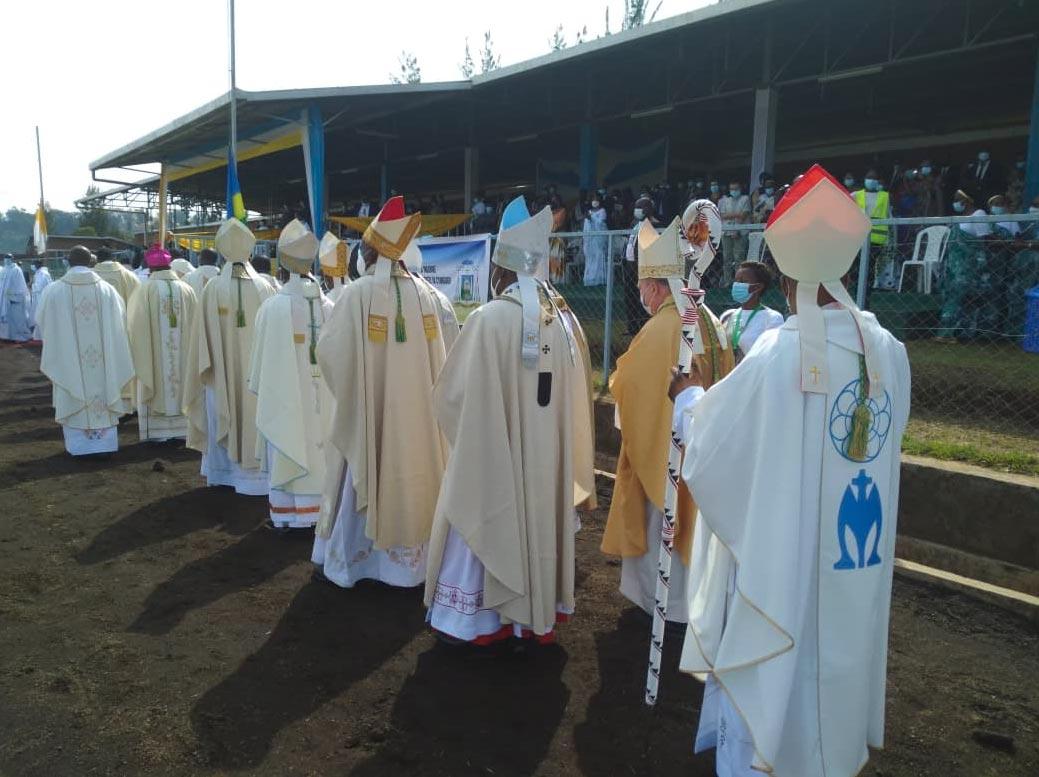
"Which is a more serious crime, sexual abuse or genocide?" asks Ndorimana, former vicar general of Cyangugu diocese from 1988 to 2002. “If the Church sanctions the first by the dismissal of clergy, why doesn't it do so for the crime of genocide, to which it turns a blind eye?” And he wonders: "When will the Church of Rwanda and the Vatican look into the cases of clerics guilty of genocide? Are the Rwandan bishops unaware that civil legislation does not replace canon law?”
A person familiar with the episcopal conference [which gathers all the bishops] describes the circumspection with which this problem is approached. "Some think that convicted clerics should be brought before the ecclesiastical tribunal, but others disagree for various, sometimes personal reasons,” he says. “In fact, what would happen to the relationship between the State and the Church if this ecclesiastical jurisdiction acquitted people convicted by the civil courts?”
"If he is innocent, let him celebrate in the cathedral!
A priest from the diocese of Cyangugu, which probably has the most clerics convicted of genocide, adds: "There is part of our community that sees them not as lost, black sheep, but as innocent, victims of a well-orchestrated injustice, scapegoats, martyrs of the Church." He recalls the controversial trial of former bishop of Gikongoro Augustin Misago, who was accused of genocide by the judicial authorities, by his own priests and a nun. The Vatican threw its weight behind his defence, seeing it as an "act of violence against the Catholic Church”. Like Ndorimana, this priest points to the Church and what he says are its campaigns of intimidation and corruption in most trials of priests accused of genocide, even at the International Criminal Tribunal for Rwanda.
Abbé Sekamana, twice convicted of genocide, nevertheless claims his innocence. "But who did I kill and who accused me? This affair is making me suffer, but I try to ease my heart.” His entourage seems less forgiving: "If he is really innocent, let him go and celebrate in the cathedral, or a wedding on Saint Michael's Day!" says an indignant fellow cleric.
In an article published by Jeune Afrique, academic Jean-Pierre Karegeye is scathing. "The resignation of Rwandan bishops will not take place," he writes, because the Church has "its own scale of values”. Indeed, it has never "sanctioned clerics compromised in the genocide of the Tutsis in Rwanda" but has in the past shown no mercy with "the successive resignations of Bishops Anastase Mutabazi, in 2004 and Kizito Bahujimihigo in 2007 for financial malpractice and in Mutabazi’s case dubious relations with women”.
Repentence and forgiveness
"The hand that killed can be raised again to bless," says Pastor Antoine Rutayisire of the Anglican Church in Rwanda, but only if the perpetrator repents from the heart, asks God and people for forgiveness, and takes concrete action. "Isn't the Apostle Paul an example that speaks for itself?”
The Seventh-day Adventists are adamant that the black sheep should be removed, says its legal representative, Reverend Esron Byiringiro. “No one is above the law," he says, "and the law goes hand in hand with justice. If there is evidence that anyone has been convicted by the courts for involvement in the genocide, we will not tolerate it; they cannot continue to serve our church. Trust is broken even if it is just a brush with the law.”
In the past, both the National Commission for the Fight against Genocide and the National Commission for Unity and Reconciliation (CNUR) have taken a clear position that priests, pastors and sheikhs convicted of genocide crimes should be dismissed. Today, the CNUR seems to be softening its tone, through the voice of its executive secretary Fidèle Ndayisaba: "Dirty laundry must be washed within each religious organization," he says, because according to him "repentance and forgiveness are an important step in the reconciliation process”.
This process should start, he continues, by "engaging the person concerned in the journey of repentance, which is primarily a religious concept; accepting responsibility for the harm done to society in whose eyes the person has lost moral authority; showing remorse for the harm inflicted on the victims; making a commitment to change and renounce genocide, its ideology, and related offences; and demonstrating a willingness to participate in reparation".
Some quote Jesus who, in his Sermon on the Mount, said to his disciples: "You are the salt of the earth. If salt is spoiled, how can it become salt again? It is no longer good for anything: it is thrown out and people trample on it."


